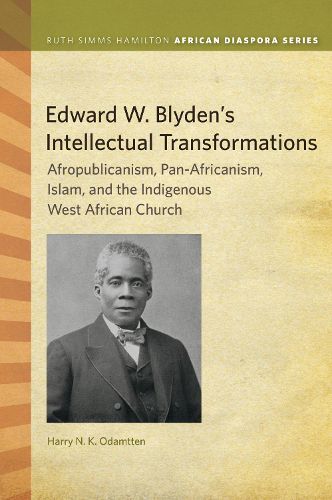Readings Newsletter
Become a Readings Member to make your shopping experience even easier.
Sign in or sign up for free!
You’re not far away from qualifying for FREE standard shipping within Australia
You’ve qualified for FREE standard shipping within Australia
The cart is loading…






Distinguished by its multidisciplinary dexterity, this book is a masterfully woven reinterpretation of the life, travels, and scholarship of Edward W. Blyden, arguably the most influential Black intellectual of the nineteenth and early twentieth centuries.
It traces Blyden’s various moments of intellectual transformation through the multiple lenses of ethnicity, race, religion, and identity in the historical context of Atlantic exchanges, the Back-to-Africa movement, colonialism, and the global Black intellectual movement. In this book Blyden is shown as an African public intellectual who sought to reshape ideas about Africa circulating in the Atlantic world.
The author also highlights Blyden’s contributions to different public spheres in Europe, in the Jewish Diaspora, in the Muslim and Christian world of West Africa, and among Blacks in the United States. Additionally, this book places Blyden at the pinnacle of Afropublicanism in order to emphasize his public intellectualism, his rootedness in the African historical experience, and the scholarship he produced about Africa and the African Diaspora. As Blyden is an important contributor to African studies, among other disciplines, this volume makes for critical scholarly reading.
$9.00 standard shipping within Australia
FREE standard shipping within Australia for orders over $100.00
Express & International shipping calculated at checkout
Distinguished by its multidisciplinary dexterity, this book is a masterfully woven reinterpretation of the life, travels, and scholarship of Edward W. Blyden, arguably the most influential Black intellectual of the nineteenth and early twentieth centuries.
It traces Blyden’s various moments of intellectual transformation through the multiple lenses of ethnicity, race, religion, and identity in the historical context of Atlantic exchanges, the Back-to-Africa movement, colonialism, and the global Black intellectual movement. In this book Blyden is shown as an African public intellectual who sought to reshape ideas about Africa circulating in the Atlantic world.
The author also highlights Blyden’s contributions to different public spheres in Europe, in the Jewish Diaspora, in the Muslim and Christian world of West Africa, and among Blacks in the United States. Additionally, this book places Blyden at the pinnacle of Afropublicanism in order to emphasize his public intellectualism, his rootedness in the African historical experience, and the scholarship he produced about Africa and the African Diaspora. As Blyden is an important contributor to African studies, among other disciplines, this volume makes for critical scholarly reading.